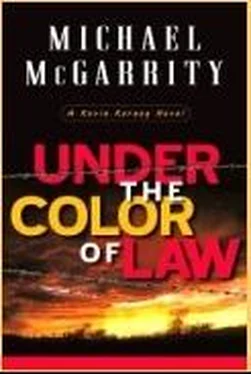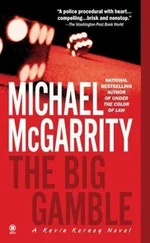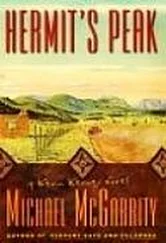Michael McGarrity - Under the color of law
Здесь есть возможность читать онлайн «Michael McGarrity - Under the color of law» весь текст электронной книги совершенно бесплатно (целиком полную версию без сокращений). В некоторых случаях можно слушать аудио, скачать через торрент в формате fb2 и присутствует краткое содержание. Жанр: Триллер, на английском языке. Описание произведения, (предисловие) а так же отзывы посетителей доступны на портале библиотеки ЛибКат.
- Название:Under the color of law
- Автор:
- Жанр:
- Год:неизвестен
- ISBN:нет данных
- Рейтинг книги:3 / 5. Голосов: 1
-
Избранное:Добавить в избранное
- Отзывы:
-
Ваша оценка:
- 60
- 1
- 2
- 3
- 4
- 5
Under the color of law: краткое содержание, описание и аннотация
Предлагаем к чтению аннотацию, описание, краткое содержание или предисловие (зависит от того, что написал сам автор книги «Under the color of law»). Если вы не нашли необходимую информацию о книге — напишите в комментариях, мы постараемся отыскать её.
Under the color of law — читать онлайн бесплатно полную книгу (весь текст) целиком
Ниже представлен текст книги, разбитый по страницам. Система сохранения места последней прочитанной страницы, позволяет с удобством читать онлайн бесплатно книгу «Under the color of law», без необходимости каждый раз заново искать на чём Вы остановились. Поставьте закладку, и сможете в любой момент перейти на страницу, на которой закончили чтение.
Интервал:
Закладка:
Message 2: "Are you busy? Should I cancel the weekend trip? Call me."
Message 3:
"Nobody at your office knows where you are. I can't spend all day trying to track you down. Dammit, Kerney, where are you! I'm flying in. Meet me at the airport if you can."
Kerney winced. Sara was justifiably pissed at being ignored. He'd put Molina and Sloan deep undercover. That meant no contact with their families or the department, no disclosure of the assignment, and no communication that could compromise the operation. Stupidly, he'd been operating with the same mindset, which was exactly the wrong thing to do. He needed to act like everything was normal.
Kerney checked the clock. Because of the difference in time zones it was an hour later at Fort Leavenworth. If Sara was true to form, she would be out on her morning run before heading off to classes. He called and left a message. The week had been hellishly busy, he couldn't wait to see her, nothing was wrong, and he was sorry he hadn't called sooner.
He'd pick her up at the airport.
He went to the bathroom, ran the shower, and called Reynaldo Valencia, a professor of Latin American studies at the university in Albuquerque.
Mitchell had phoned the professor a number of times from Brother Jerome's office. He woke Valencia up and explained his reasons for calling. Valencia agreed to meet with him immediately.
His house phone rang before he could leave. He picked up and Helen Muiz asked him if he was ever planning to come into the office again.
"What's up?" Kerney asked.
"Mr. Demora, the city manager, is eager to see you."
"About?"
"He wouldn't say. But he left three messages last night after six P. M."
"You're at the office early."
"Someone has to hold things together in your absence."
"I have a deputy chief now, Helen."
"Yes, and thank goodness he's here to assist me. You also have other tasks waiting that need your attention."
"Can they hold?"
"I suppose so." Helen sighed.
"Call Demora and ask him if this afternoon would be convenient."
"And where will you be until then?"
Kerney thought fast.
"I have a doctor's appointment in Albuquerque."
"Is something wrong?"
"Just the knee acting up again."
"You should get it looked at," Helen said sympathetically.
"You've been limping rather badly lately. I'll put you down on sick leave for the morning."
Even though he had no visible tail, Kerney ditched his unit in front of his orthopedist's office in Albuquerque and called a cab to pick him up at the back of the building. Reynaldo Valencia lived near the university on a street named for one of the early presidents. The house was a fifties post-war, Santa Fe-style single-story residence sheltered from the street by mature shrubs and large trees.
Valencia was a tall man with graying hair that matched the color of his neatly trimmed mustache. He greeted Kerney with a serious, questioning expression and guided him to a family room that proclaimed an enjoyment of books and learning.
Shelves crammed with books filled walls from floor to ceiling, magazines, journals, and newspapers filled table tops and thick dictionaries and atlases rested on pedestal stands.
"I don't know if I can help you," Valencia said. He gestured at a comfortable chair and took a seat in a rocker. He spoke perfect English with a slight Spanish accent.
Kerney sat down.
"I'm sure you'd like to see Father Mitchell's killer brought to justice."
"Very much so. But my experience has made me rather distrustful of police officers."
"I'm sorry to hear that," Kerney said.
"Have you had some bad experiences with the police?"
"Indeed, I have.
For example, it was the police who inadvertently introduced me to Father Mitchell," Valencia said.
"We met in jail, after having been arrested during a peaceful, nonviolent demonstration at the entrance to Fort Benning. The police roughed us up, handcuffed us, put us in paddy wagons, and locked us in a cell for hours. They had no cause to do it."
"That doesn't sound pleasant," Kerney said.
"Unfortunately, not all police officers are competent or well led.
Would a belated apology from an officer who had nothing to do with taking you to jail make it better?"
"You're joking," Valencia said
"Only partially," Kerney replied.
"I don't appreciate cops who make the rest of us look bad. It destroys the public's trust and makes the job more difficult."
"Why should I assume that you're really any different? How can I be sure of your motives?"
"Perhaps if we talk for a while, you'll be able to form an opinion or make a judgment about those questions," Kerney said.
Valencia studied Kerney for a few seconds.
"That's fair enough. But if I think you've come here to investigate my political beliefs and actions, or those of my friends and associates, I will cut you off."
"That's more than reasonable," Kerney said.
"I take it you came to know Father Mitchell fairly well after your time together in jail."
"Yes, we were both active in the School of the Americas Vigil Committee."
"From what I've learned, he seemed intent on discovering the specifics about his brother's death."
Valencia took a pipe from a side table and toyed with it.
"It was constantly on his mind. He spent a year in Venezuela and Colombia searching for answers."
"What did he uncover?" Kerney asked.
Valencia filled his pipe.
"He believed that his brother had been put in charge of establishing a secret training facility for assassins who were to be sent into Colombia to murder members of the drug cartels."
"Funded and operated by our government?"
Valencia nodded.
"Using the same ruse that failed so miserably in Vietnam, military advisors."
"Father Mitchell was convinced of this?"
"Yes. His brother was an experienced intelligence officer who specialized in training field operatives."
"Did he have proof?" Kerney asked.
Valencia lit his pipe and the scent of tobacco filled the room.
"He was never able to corroborate his theory. Most of the information came to him as rumor or supposition."
"What did he learn about his brother's death?"
"Supposedly, the murder was arranged by drug lords who learned of the colonel's mission from a bribed Colombian army officer. As I understand it, Colombian police were to be trained in Venezuela by the U. S. Army, then sent home to infiltrate the cartels and kill the jefes and their associates. At the time a commonly held belief among American intelligence agencies was that the cartels were nothing but a large-scale version of common street dealers. In fact, the cartels had a superior intelligence-gathering apparatus."
"Did the mission go forward after the colonel's death?"
"Yes, but not quite the way it was supposed to," Valencia said.
"Our government unwittingly placed in the hands of the cartels a cadre of qualified assassins who were used against the supporters of the American-backed drug interdiction program."
"The jefes infiltrated the project?"
"No, they simply identified the recruits, waited until they were trained, and bought the services of most of them. Jump ahead in time.
The police assassins who refused to serve the jefes are murdered one by one. Car bombs kill ranking federal prosecutors. Politicians running on anti cartel platforms disappear. The federal official in charge of drug interdiction, a man of impeccable reputation, is killed by a sniper's bullet. Journalists sympathetic to the anti cartel movement are found burned to death in tragic automobile accidents. Judges are kidnapped, held for ransom, and then shot. Are these the acts of untrained, unsophisticated street thugs?"
"I doubt it," Kerney said.
Читать дальшеИнтервал:
Закладка:
Похожие книги на «Under the color of law»
Представляем Вашему вниманию похожие книги на «Under the color of law» списком для выбора. Мы отобрали схожую по названию и смыслу литературу в надежде предоставить читателям больше вариантов отыскать новые, интересные, ещё непрочитанные произведения.
Обсуждение, отзывы о книге «Under the color of law» и просто собственные мнения читателей. Оставьте ваши комментарии, напишите, что Вы думаете о произведении, его смысле или главных героях. Укажите что конкретно понравилось, а что нет, и почему Вы так считаете.












